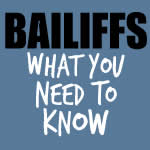If you get an email entitled LEGAL NOTICE OF ATTACHMENT OF EARNINGS that sounds very alarming... But this may be the start of a scam and the sender wants you to panic so you will make a bad decision. An example of a scam email Here is one such email: This is xxxxxx from CBL ( Collection Bailiffs Limited ). Hope you are doing well. I just would like to tell you that we have got a legal … [Read more...]
Threats of CCJs and bailiffs – are debt collectors bluffing?
Have you received scary letters from a debt collector demanding payments? These letters may threaten defaults, county court judgments (CCJs) and bailiffs taking your possessions. Sometimes the letters are bluffing, but the number of CCJs is continuing to go up. In the first half of 2019, there were 586,765 CCJs and more than half were for less than £650. This article covers consumer debts … [Read more...]
Bailiffs – do you have to let them in? What you need to know.
A visit from bailiffs is a nightmare idea for many people. They have changed their name to enforcement agents but that doesn't make it any less scary. This article looks at what happens after a debt is sent to the bailiffs, the two key rules for dealing with bailiffs and what to do if things go wrong. There is a section at the end about good (and bad) places to get help. In 2021 the new Debt … [Read more...]


